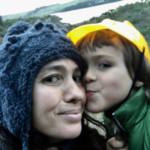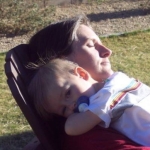Public Group
Active 1 month ago
All members can join this group (by simply clicking the “Join Group” blue button below). This group is a place for members to ask questions, share or seek support relating to any of the eCourses in this Peaceful Parent Village.
You can access the eCourses or this group at any time through the drop-down menu under your profile picture in top menu. Optionally, you can post in the main Village forum.
Check in time – Module 5 of the Step by Step eCourse
Tagged: i statements, problem solving, step by step ecourse
- This topic has 9 replies, 6 voices, and was last updated 4 years, 8 months ago by
 Genevieve Simperingham.
Genevieve Simperingham.
-
AuthorPosts
-
-
31/10/2019 at 9:35 pm #10320
 Genevieve SimperinghamKeymaster
Genevieve SimperinghamKeymasterHi everyone,
I’d love to get some responses in this thread to hear how you’ve been getting on with the Step by Step eCourse. Firstly to dissipate any tensions, if you cringe to read this and think Drat I’ve really fallen behind, then I can assure you you’re not alone. Over the years of running this eCourse this has been a pattern, it’s just hard to keep up the momentum. So this is a really friendly, loving, encouraging nudge to connect back in to the material because you absolutely will be so glad if you do.
In Module 4 we explore Active Listening, I Statements and Problem Solving. Really getting the suss on using these basic but invaluable tools in day to day interactions with your child / children / and partner starts to make a really big difference. Simple in theory but hard to put into practice, but so very worth it. Having these communication skills at the forefront of your mind can make just about any and every challenge in your days dramatically easier to navigate. Active listening allows the speaker to feel heard and cared for, I statements gives you a way of expressing your feelings and needs in a non-blaming way while modelling to your child the same and every time you problem solve you are supporting your child’s problem solving skills and enlisting them into solving problems. Kids are dramatically more enthusiastic to shift focus and go with the solution when they’ve played a part in working it out.
In Module 5 we start to really tune in to the importance of releasing stress through tears and tantrums. That backlog of frustrations and stress causes havoc in the body, nervous system and brain, while releasing tears when the child feels safe, heard and given permission to release drains their nervous system of all that intensity of stress and emotional backlog.
The more we come to peace with sitting in the discomfort of listening to our child express their upsets, the stronger we can become in holding loving limits when they’re needed and necessary. Which is about creating and maintaining healthy boundaries in the family and helping your child develop their self-discipline.
Regardless of which Module or unit you’re at, what’s one of your insights? What’s a question or a niggle that it’s brought up for you? What if anything do you wish you had learned a year or more ago?
-
01/11/2019 at 6:46 pm #10324
 KatherineTParticipant
KatherineTParticipantI have just finished module 3 after a 2 week health hiatus. The simple breakdown of how a family meeting might look like was really useful for me. I especially liked the reminder to keep a positive atmosphere, so positive associations are made with the ritual and to let each person express their needs and wants no matter how impractical they might seem. Also the suggestion to start with something fun and simple helped it feel accessible, and not as daunting to implement. Family meetings are new to our family. We have just been checking in informally over dinner sometimes about our day (this could be a place to bring in a meeting or mini meeting). Mostly the bigger conversations happen during play with Hugo as he finds it hard to stay with a conversation too long if he’s not moving or zoned in at bedtime. The Bedtime ritual of Hugo and I lying together debriefing about the day has been beneficial for us for a long time- what we liked, what was hard often opens space for more to be shared and worked through and for struggles to be addressed. Hugo is most able to be vulnerable and share what he is finding hard at this time. He used to say ‘you tell..’ and I would try to sleuth my way through without over prompting. Now we tend to ask each other, “what did you do today?” and he always wants me to start. So I try to make openings in what I say about my day to make it easier for him to share. He might ask me questions as a way of sharing his own experience, and then say “me too.”
-
02/11/2019 at 1:35 pm #10325
 Bron Van der GeestParticipant
Bron Van der GeestParticipantKia ora koutou,
Must be something in the air Katherine I too have just completed Module 3…hosptal procedure completed back to better health:-) Its what happens when you are not proactive with yourself first, as a parent and consistently give to others forgetting to nurture you. Over the long weekend instead of getting into the modules I put the modules into practice. We had our mokopuna stay with us in the camper 1 and 4-year-olds. The 1 year is still full tome breastfeeding so I knew we would have some fun during the night. Over the course of the day we explained to them both where we would sleep and showed them the bed set up including their favourite pillows, blankeies, books, water bottles. We had a celebration at the beach, had tea out and danced with a live country band then went back to the camper had showers, got into PJ’s climbed into bed and read books. The 4-year-old fell asleep in the blink of an eye. He has been in the camper before. The talking beforehand about the day what they wanted to do, how everything should be set up settled and connected him. The 1-year-old fell asleep not long after. He woke at 12 had some water and fell back to sleep, At 4 AM he was not impressed with the water but I made deep breathing sounds, hummed and he put his hands inside my mouth and this calmed him. Mindfulness in action. (I watched this morning as my daughter did the same action to help him go down….it’s become a family tradition. I did not ask her if this was part of back to sleep routine lucky guess:-) The reason why they were both so at ease to me is the connection, discussion, time and being present asking them what they wanted to do and honouring this. As a busy parent of 5 wee wonders in the past, I feel that this critical step was often left out. Having mokopuna is a gift and we treasure EVERY spilt second. Perhaps this is why grandparenting is so easy you ARE present, you ARE calm, You ARE connected, and ARE in your joy.
-
03/11/2019 at 3:51 pm #10328
 Meg RodneyKeymaster
Meg RodneyKeymaster@katherinet – I’m glad to hear the family meeting breakdown was helpful. We also do daily check-ins at various times of the day. I. Addition to the “what did you do?” questions, I like “what was your favorite part of the day?” and/or “what do you wish would have happened differently?” The latter can really be revealing. My boys, too, look for me to lead (well, my younger son does; my 16 yo is pretty comfortable saying whatever is on his mind and heart). We don’t do more formal family meetings all that often, but I find them helpful when we have decisions to make.
-
03/11/2019 at 3:56 pm #10329
 Meg RodneyKeymaster
Meg RodneyKeymaster@bron23 – I am sorry to hear of you needing a procedure, but I am hoping you are on the mend. So hard to care for ourselves when we are in the habit of putting other needs first, isn’t it?
How lovely that you were able to put the modules into practice with the wee ones. That centered focus certainly seems to have been helpful for the night-time. What beautiful memories were made!
-
12/11/2019 at 7:33 am #10360
 Tycee BelcastroParticipant
Tycee BelcastroParticipantI am working through Module 7 I believe about using play in helping children deal with stressful situations. I have not started Mama Meltdown yet.
In the article about play reversals this is written,
“Nature Play.
Can you remember your favourite trees, rocks and rivers from your own childhood, on your property or at a nearby park? Children who feel deeply bonded with the earth can feel more secure in their world and likely grow up to want to care for nature.
When a child climbs a tree, they not only stretch and strengthen their muscles, develop their coordination, and explore their edges with height and balance, they also deeply bond with the tree, as they intimately become familiarized with the shapes, textures and smells of the tree. Unlike playground equipment (which also offers much enjoyment to children), each branch of a tree has a different level of strength and flexibility, there’s a relationship, a two way dynamic between the child and the tree.”
I love love love this. I wanted to share that I study with a wilderness mentor to learn nature connection and survival and navigation strategies. One of the skills he teaches is called a song-line. It is a skill to use to navigate where you are so you do not get lost. It starts with finding a landmark that stands out as different – like a large tree or something. Then we stop and really look at the tree and make up a story about it. By the time we are done, we have a full story and a name for the tree. I have a tree on my property called Cruella Deville because it is dead on one side and alive on the other. Anyway, then you move on the to next land mark just as you are far enough away that the last one will disappear from view, and make up another story. The cool thing is that the song-line, with all the stories and engagement in creating them, makes you remember the whole line of landmarks so much better than if you tried to just memorize them. The stories infuse play, connection, joy and creativity. You actually get to know individual trees and make a connection. I am 56 years old, and learning this skill makes me happy. It is joyful, fun, connecting, and playful. If I feel that way, imagine how a child would feel!
-
12/11/2019 at 10:06 am #10361
 Tabitha JonsonKeymaster
Tabitha JonsonKeymasterI love this Tycee! I find the same that certain landmarks round our home acquire special names along the way but love the idea of creating those stories around them and using that to create a journey.
Off to Wild Child (a forest school / nature day type thing) this arvo and would be a prefect place to try this..
-
12/11/2019 at 10:08 pm #10366
 Genevieve SimperinghamKeymaster
Genevieve SimperinghamKeymasterTycee this is so interesting!! So lovely that you’ve made your way through all the units and that you’ve so enjoyed the play material. I so recommend Aletha’s Solter’s Attachment Play and have you read Larry Cohen’s book Playful Parenting?
I also love the idea of weaving a story that helps you remember all the important landmarks. This is a really great activity to do with children! I just love the sound of the work you do with your wilderness mentor. It sounds all a bit like the Tom Brown work.
I’m presenting this coming weekend at an annual Nature Education Conference that I’ve been on the committee for and presenting at for the last 10 years. It’s a professional development conference for educators and professionals working with children, or anyone passionate about reconnecting children with nature and nature immersed education. I reckon you’d really love it!
-
13/11/2019 at 5:50 pm #10367
 Tycee BelcastroParticipant
Tycee BelcastroParticipantYes I believe my mentor studied with Tom Brown Jr. I am sure I would love the conference you are presenting at.
-
14/11/2019 at 10:52 am #10369
 Genevieve SimperinghamKeymaster
Genevieve SimperinghamKeymasterThat’s so interesting Tycee. I read Tom Brown’s book about 20 years ago and loved it! Around that time I did a two year shamanic training with a woman who had trained with Tom Brown, it was a pretty awesome adventure.
-
-
-
AuthorPosts
- You must be logged in to reply to this topic.
